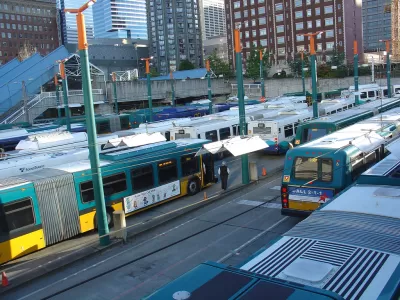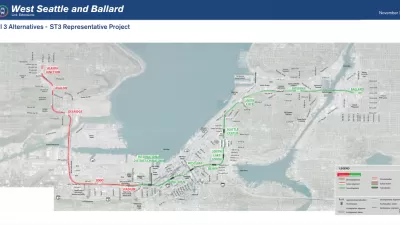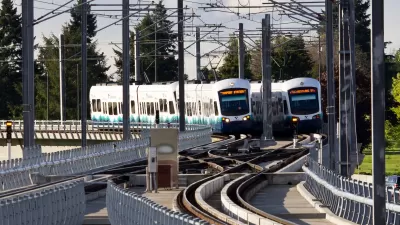While the federal government withdraws financing support for public transit, one writer says Democrats in the state of Washington need to gird support for Sound Transit 3's funding initiatives.

The anti-transit coalition in the state of Washington gains support from the inaction of Democrats in the State Legislature, according to an article by Robert Cruickshank.
The example du jour of the willingness of Washington Democrats to undercut transit funding is found in a controversy over car tabs. As reported by David Gutman in March 2017, the passage of Sound Transit 3 had at least one surprising consequence for many Seattle residents: higher car tabs. Then, in April, Gutman reported that Democrats were willing to change the calculation of the car tab fees, potentially bringing less money to Sound Transit. Last year's legislative session failed to pass a bill that would cut the cost of car tabs for drivers.
Cruickshank notes the strong polling and election performances of Democrats in the state last year, despite the lack of action on the car tabs. Thus, Cruickshank argues, it's clear that Democrats need to stand up for transit, and not capitulate to their fear of "an angry pack of anti-tax wolves."
According to Cruickshank, transit needs support from state Democrats more than ever, even if the fear that they will lose power to state Republications might be misplaced: "Last year the Trump Administration delayed its delivery of a crucial $1 billion federal grant for the Lynnwood Link project and will make a final decision this year. Sound Transit continues to be worried about these federal grants, and for good reason." Look no further than the Trump Administration's decision to rescind the financing plan for the Gateway Project in New York and New Jersey, writes Cruickshank, for evidence of this threat.
FULL STORY: Democrats Need To Stand Up For Sound Transit

Alabama: Trump Terminates Settlements for Black Communities Harmed By Raw Sewage
Trump deemed the landmark civil rights agreement “illegal DEI and environmental justice policy.”

Study: Maui’s Plan to Convert Vacation Rentals to Long-Term Housing Could Cause Nearly $1 Billion Economic Loss
The plan would reduce visitor accommodation by 25% resulting in 1,900 jobs lost.

Why Should We Subsidize Public Transportation?
Many public transit agencies face financial stress due to rising costs, declining fare revenue, and declining subsidies. Transit advocates must provide a strong business case for increasing public transit funding.

Wind Energy on the Rise Despite Federal Policy Reversal
The Trump administration is revoking federal support for renewable energy, but demand for new projects continues unabated.

Passengers Flock to Caltrain After Electrification
The new electric trains are running faster and more reliably, leading to strong ridership growth on the Bay Area rail system.

Texas Churches Rally Behind ‘Yes in God’s Back Yard’ Legislation
Religious leaders want the state to reduce zoning regulations to streamline leasing church-owned land to housing developers.
Urban Design for Planners 1: Software Tools
This six-course series explores essential urban design concepts using open source software and equips planners with the tools they need to participate fully in the urban design process.
Planning for Universal Design
Learn the tools for implementing Universal Design in planning regulations.
Caltrans
Smith Gee Studio
Institute for Housing and Urban Development Studies (IHS)
City of Grandview
Harvard GSD Executive Education
Toledo-Lucas County Plan Commissions
Salt Lake City
NYU Wagner Graduate School of Public Service




























